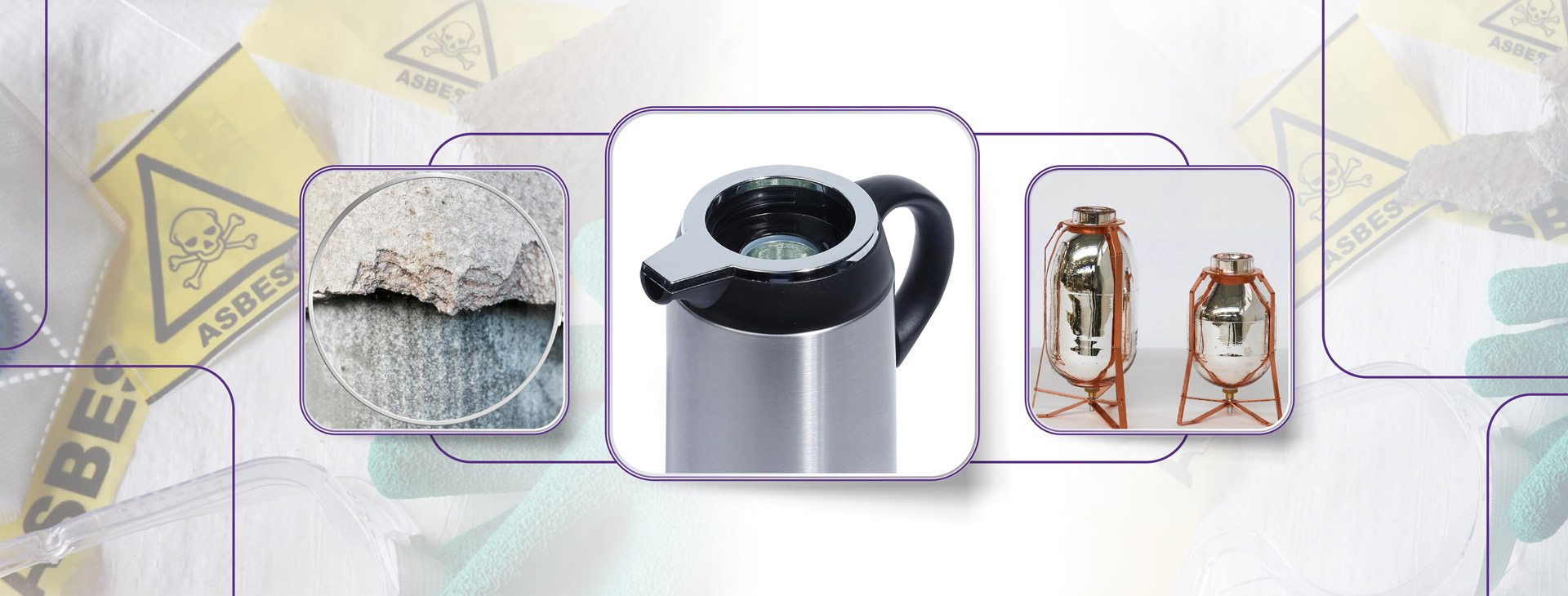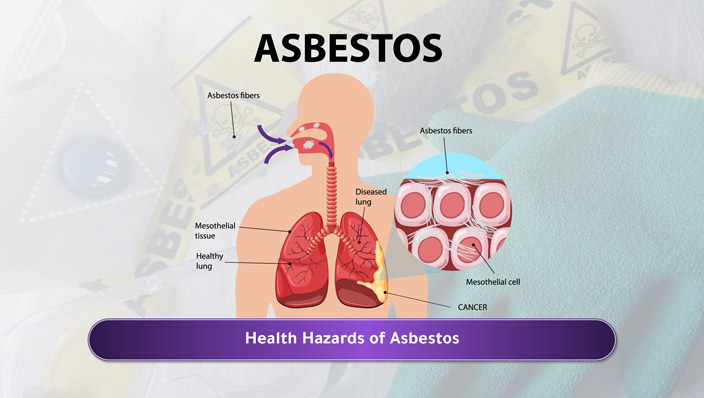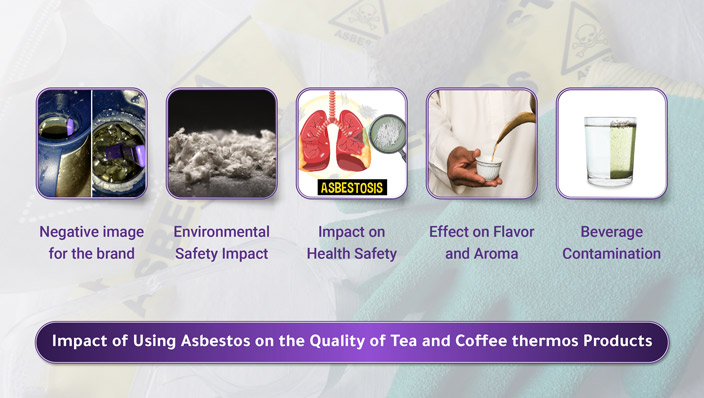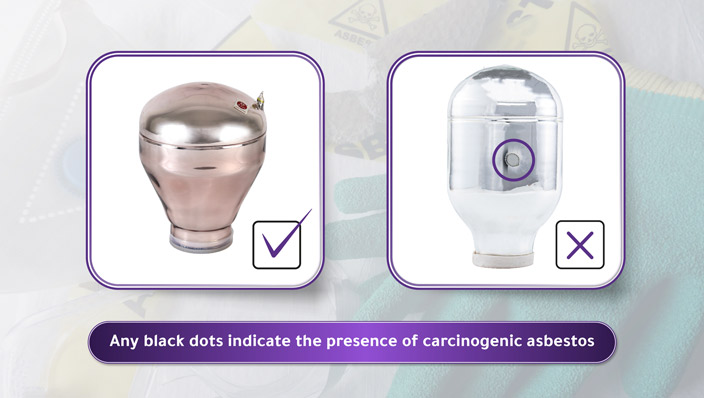 The ultimate guide to purchase thermoses
The ultimate guide to purchase thermoses
 The ultimate guide to purchase thermoses
The ultimate guide to purchase thermoses
When we savor a cup of authentic tea or inhale the rich aroma of coffee, we undergo an exceptional experience intertwined with our cultures and daily routines. The warm morning tea and the relaxing coffee are sources of gathering and special moments in our lives. Behind these delightful experiences lies a complex process of crafting tea and coffee thermoses, combining craftsmanship and science to produce these wonderful beverages.
With the increasing interest in coffee and tea culture worldwide, the industry of tea and coffee thermoses has become a vital part of the global economy and culture. This industry reveals a complex and intertwined story of technology, art, concern for ingredient quality, and intricate details, which sometimes may have a dark side. Here, we are discussing the use of asbestos in the manufacturing of thermoses and the direct threat it poses to human health.
The subject of this article is not merely a fleeting glance at the thermos industry but a call to pause and reflect on the repercussions of using asbestos, which still finds its way into some fake thermoses in the markets.
In this article, we will shed light on the potential danger it may pose, as asbestos is one of the materials used in the production of inferior and counterfeit thermoses. However, with the advancement of environmental and health awareness, research has begun to reveal its harmful effects on both humans and the environment.
In the following paragraphs, we will delve into more details about the dangers of using asbestos in thermos manufacturing, focusing on poor and traditional materials that can negatively impact public health and the environment. We will also discuss the industry's efforts toward sustainability and health, and how we can improve and innovate to ensure the provision of safe and healthy thermos products that strike a balance between industrial progress and environmental protection.
Index:
Defining asbestos and highlighting its known health hazards.
Asbestos and the Tea and Coffee Thermos Industry.
The effect of using asbestos on the quality of tea and coffee thermos products.
How to identify thermoses containing asbestos?
Defining Asbestos and Highlighting Its Known Health Hazards:
Asbestos is a natural mineral composed of fine and thin fibers, known for its resistance to heat and chemicals. It was widely used in various industries due to its distinctive properties, such as thermal, electrical, and mechanical insulation. However, over time, it was discovered that the use of asbestos could have serious health effects.

Health Hazards of Asbestos:
Lung Cancer and Cancerous Diseases: Asbestos is considered a carcinogenic substance, linked to an increased risk of lung cancer and respiratory system cancer. Fine asbestos fibers can scatter in the air and attach to the lungs when inhaled, causing irritation, tissue inflammation, and an increased risk of developing cancerous diseases.
Respiratory Diseases: Fine asbestos particles cause irritation and damage to lung tissues, leading to respiratory diseases such as pneumonia, pulmonary fibrosis, and bronchogenic carcinoma.
Pulmonary Fibrosis and Lung Atrophy: Prolonged inhalation of asbestos fibers can lead to fibrosis in lung tissues, resulting in the destruction of lung structures and a decrease in respiratory capacity.
Other Diseases: In addition to the mentioned diseases, asbestos is also associated with cardiovascular risks and can contribute to conditions like vasculitis and arterial stenosis.
It should be emphasized that exposure to asbestos increases the risk of developing these diseases, and exposure is more common in work environments that involve direct interaction with asbestos, such as in the manufacturing of thermoses, construction, and insulation. Therefore, reducing exposure to asbestos and using safe alternatives have become essential to preserving the health of workers and the public.

Asbestos and the Industry of Tea and Coffee thermoses:
The use of asbestos in the manufacturing of tea and coffee thermoses is now rare in our current days due to the increased awareness of the dangers of this material to health. However, it is still used by some thermos manufacturers for various purposes:
Heat Insulation:
In the past, asbestos was used in tea and coffee thermoses for heat insulation purposes. Asbestos was placed inside the thermos or pitcher to help maintain the temperature of the beverages. This usage was common in earlier times before the harmful effects of asbestos on health became known.
Safety and Protection Elements:
In some cases, asbestos was used in the production of internal parts of tea and coffee thermoses, such as lids or thermal barriers, aiming to reduce the transfer of heat from hot beverages to the external surface of the thermos.
It should be emphasized that these uses may be limited and do not represent the current situation in the tea and coffee thermos industry. However, some thermoses in the markets still contain asbestos, as revealed by regulatory authorities occasionally.
Over the years, awareness of the dangers of asbestos to health and the environment has increased, leading to the development of safe and healthy alternatives for these uses.

Impact of Using Asbestos on the Quality of Tea and Coffee Thermos Products:
The impact of using asbestos on the quality of tea and coffee thermos products can be multifaceted, involving negative effects on quality, safety, and, of course, the overall product. Among the drawbacks are:
Beverage Contamination:
The use of asbestos may lead to contamination of beverages with fine fiber particles, affecting the purity and clarity of tea and coffee. This contamination can cause changes in the color, taste, and aroma of the drinks, negatively impacting the consumer experience.
Effect on Flavor and Aroma:
Asbestos may affect the flavor and aroma of tea and coffee. Fine asbestos particles may interact with the beverages, causing changes in the original taste and smell of the products.
Impact on Health Safety:
Inhaling asbestos particles or their transfer into beverages can pose health risks to consumers. Consuming products contaminated with asbestos particles may increase the risk of respiratory and carcinogenic diseases.
Environmental Safety Impact:
Disposing of thermos products contaminated with asbestos can pose a serious challenge. These fine fibers can transfer to the environment, causing environmental pollution and affecting plants and animals, disrupting the ecological balance.
Negative image for the brand:
The use of asbestos in tea and coffee thermoses can lead to a tarnished reputation for the products, lowering trust in their quality and safety. This can hurt the brand's reputation and consumer preferences.
In general, the analysis indicates that using asbestos in the tea and coffee thermoses industry can have negative effects on product quality, health safety, and the environment. This underscores the importance of using safe and healthy alternatives to maintain product quality and ensure the safety of consumers and the environment.
Don't miss: Journey Through Time with Tea and Coffee thermoses

How to Identify Thermoses Containing Carcinogenic Asbestos?
Identifying tea and coffee thermoses containing asbestos can be challenging and may require following certain procedures and paying attention to product details. However, here are some points that can help you recognize warning signs indicating the presence of asbestos in tea and coffee thermoses:
Inspecting Ingredients and Labels:
Carefully inspect product labels and check the inner glass of the product. If you find dark or black spots contrasting with the color of the inner glass, this is a sign of asbestos use.
Buying from Reliable Sources:
Always try to purchase tea and coffee thermoses from reliable and well-known sources, such as major retail chains or authorized sellers of reputable brands. This increases the chances of obtaining products that are safe and asbestos-free.
Checking Reviews and Reports:
Reviews and reports from other consumers online can help you learn about specific products and their experiences. You can search online for additional information if you have doubts or concerns about a particular product.
However, it should be noted that tea and coffee thermoses containing asbestos are likely very rare at present due to the increased awareness of the dangers of this material. In general, it is advisable to avoid any product suspected of containing asbestos and adhere to purchasing certified and safe products.
Don't miss: Tea and coffee in a thermos, a touch of authenticity
In conclusion, using asbestos in the industry of tea and coffee thermoses poses a serious risk to public health and consumer safety. The effects of this toxic substance range from contaminating beverages with its fine particles to increasing the risk of chronic and cancerous diseases. Understanding and being aware of these risks emphasizes the need to avoid using asbestos at any stage in the production of tea and coffee thermoses.
Encouraging the use of safe and healthy alternatives in the industry represents a crucial step toward maintaining product quality and consumer health. Investing in innovative technology and using reliable materials can enhance the safety and sustainability of this important industry.
Therefore, manufacturing companies and stakeholders in this field should work together to uphold safety and health standards, ensuring the provision of high-quality products free from harmful substances. Commitment to the safe and responsible use of materials and technologies enhances the consumer experience and contributes to building a positive reputation for the industry in the future.